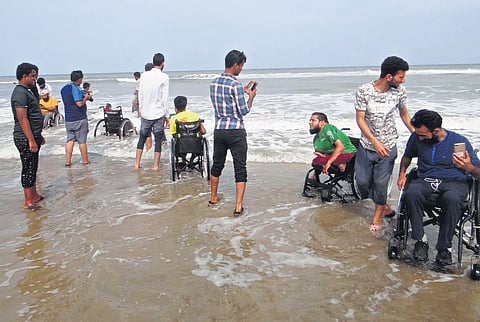

CHENNAI: A city’s heritage is the inheritance of all the people who constitute it. But is it really? For a section of people, access to certain heritage spaces has been elusive. With infrastructural barriers, a lapse in identifying solutions, failure of execution and lack of social inclusiveness limiting the disability diversity, heritage collective Nam Veedu, Nam Oor, Nam Kadhai (NVNONK) hosted its 20th inclusive heritage trail on the need for accessible heritage spaces in the city.
The panel included Srivatsan Sankaran of Madras Photo Bloggers, author Sundari Sivasubbu, sign language interpreter Chitra Devi Muthu; Deepak Sharma, Aditya Sharma and Shashank of Explore Differently, Chinnappa Mathanda of aSPECIALworld, and Kalai, mother of Jyothi, a person with disabilities. The talk discussed the need for broad participation and recommendations to strengthen social cohesion.
“All modes of public transportation and their affiliated stations and depots should be made disability-friendly. Smart parking spaces should come up. Be it private or a government-run space, the needs of those with disabilities should be prioritised,” said Kalai, reiterating that the focus should be on equipping spaces to accommodate persons with disabilities instead of building exclusive spaces.
From medical treatments, enrolments in educational institutions to becoming part of decision-making processes, for deaf people, sign language is key to accessing rights, it seems. “The vocabulary in sign language is currently limited. We also need to focus on introducing more words and terms; especially those that are technical to ensure that people from the community are equipped with the knowledge needed to understand and thrive in the real world,” said Srivatsan.
The need for facilities to enable comfortable travel opportunities, retrofitting public spaces with assistive devices, technologies and infrastructural elements, inclusivity in places of recreation, and creating an empowering environment that provides a sense of belonging — recommendations for companies, disability access auditors, organisations, the able-bodied public were proposed, in the hope of it reaching the policymakers.
“A societal change will happen only when professional recommendations happen and lived experiences are taken into account. The society’s thoughts will change through these experiences, recommendations, research and conversations. We need a separate policy which includes all the suggestions,” said Thirupurasundari Sevvel of NVNONK.